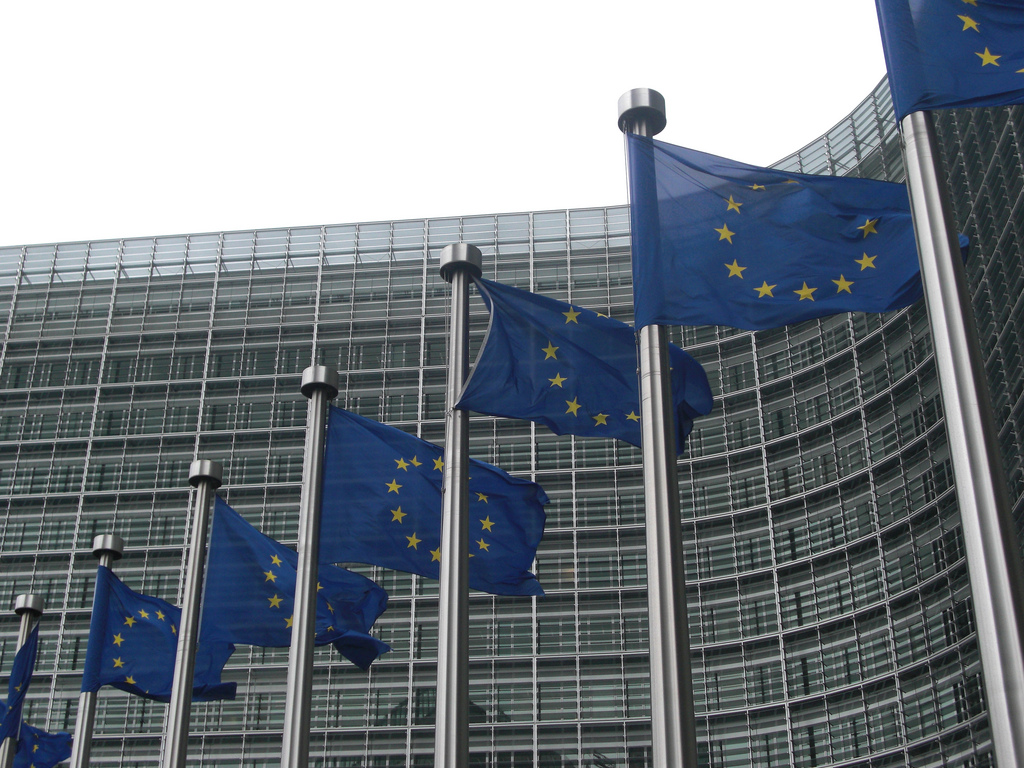by Eldar Mamedov
On October 14, European Union foreign ministers condemned the Turkish incursion into northeastern Syria. The Turks have undertaken this operation ostensibly to clear the border of Syrian Kurdish fighters whom Ankara regards as terrorists, but much of the rest of the world regards as the key force fighting the so-called Islamic State (IS or ISIS). In their conclusions, the ministers called for a ministerial meeting of the international coalition against ISIS to assess the impact of the Turkish offensive. They also, in a somewhat convoluted language, committed to “strong positions” regarding arms exports to Turkey, which is as close as the EU has ever come to endorsing a halt on arms sales to a NATO member state.
It is encouraging to see the EU take a united and strong position against what is unambiguously a violation of international law that is enabling crimes against civilians and provides an opportunity for ISIS to re-emerge, regroup and plot future atrocities. Yet, apart from expressing political disapproval and adopting sanctions, Europe has few options to affect events in the ground. This has to do with the choices the EU made at the outset of the Syrian conflict.
As early as in 2011, the EU followed the U.S. lead in concluding that Bashar al-Assad, Syria’s president, has forfeited his right to rule by using excessive force against pro-democracy protestors, and therefore had to go. Assad’s regime is undoubtedly nasty. However, this narrative of moral outrage as the driving force behind that EU decision has to be qualified by at least two weighty considerations.
First, neither the repressive nature of the regimes nor their wars against civilian populations are per se insurmountable obstacles for European governments to conduct business with them. Britain and France provided ample arms and logistical support to Saudi Arabia’s war effort in Yemen, which involved massive violations of international humanitarian law. Egypt’s regime of Abdel Fattah al-Sisi is essentially no different from Assad’s in filling jails with political opponents, yet is embraced by EU statesmen as a bulwark of stability in northern Africa and a key security partner against terrorism and uncontrolled migration.
Second, obnoxious though Assad regime is, parts of the opposition are no better. At an early stage, the uprising against Assad was contaminated by strong sectarian undertones directed primarily against minority Alawites, Shiites, and Christians. Even before the emergence of the particularly bloodthirsty ISIS, violent Salafist and jihadist groups, some of them linked to al-Qaeda, took on an increasingly prominent role in what quickly morphed from a peaceful uprising into a vicious civil war.
Thus, moral outrage at Assad’s atrocities may have played a role in determining the positions of the EU governments, but the main reasons for taking the side of the Syrian opposition appear to be geopolitical. In addition to the United States, the Assad regime was also opposed by several EU allies in the region—including Saudi Arabia, Qatar, Jordan, and Turkey. Assad, by contrast, was backed by EU adversaries—Russia, with which EU’s relations nosedived following its illegal annexation of Crimea in 2014, and the Islamic Republic of Iran.
In the event, however, the “wrong side”—Assad, with his Russian and Iranian backers, has prevailed in the civil war. The EU, as a result, has found itself largely irrelevant when it comes to determining the political future in Syria. Other partners in the anti-Assad coalition, meanwhile, recalibrated their positions. Donald Trump has repeatedly signaled willingness to extricate the U.S. from the Syrian quagmire. In doing so, he has ignored the EU’s position and callously suggested that, in case of further instability in Syria, refugees will flee to Europe, not America.
Turkey narrowed its objectives to fighting the main Kurdish force in the region, the People’s Protection Units (YPG), whom it sees as closely allied with the Kurdistan Workers’ Party (PKK), its main nemesis. Removing Assad from power slipped off the Turkish radar as Ankara engaged with Moscow and Tehran on finding a settlement to the Syrian war.
The United Arab Emirates (UAE) and Bahrain reached out to the Assad regime, and the UAE reopened its embassy in Damascus. Bahrain was on track to follow suit before it was reportedly discouraged from doing so by the U.S. Even Saudi Arabia is coming to terms with Assad’s continued rule. Syria’s readmission to the League of Arab States now increasingly looks like a foregone conclusion, with the question being only when it will happen. Meanwhile, Russia maneuvers to position itself as a key diplomatic mediator in the region, including between sworn enemies Israel, Saudi Arabia, and Iran.
The EU has failed to step up its own game. Trump’s decision to abandon the Syrian Kurds was neither surprising nor abrupt—he first announced a U.S. withdrawal, which was then rolled back by his own officials, in December 2018. It was all too predictable that sooner or later the EU would find itself in a situation where it neither had its own assets on the ground nor could rely on its U.S. ally.
The EU should have done what it knows how to do well: multilateral diplomacy. That should have included a cautious and conditional re-engagement with Damascus as recommended by the European Council on Foreign Relations. Had the EU re-established these ties, it could have used its influence to quietly encourage Damascus and the Syrian Kurds to reach an understanding that could at least offer a modicum of safety to the Kurds, even at the cost of some of their autonomous status—the right to live always comes first. The Turkish offensive has pushed both sides towards such an understanding anyway, but, tragically, only after it had stripped the Kurds of most of their negotiating leverage. At the same time, the EU could have used its channels of communication with Turkey to address its legitimate security concerns stemming from PKK-YPG ties, and to prevent a full-blown crisis with a NATO member.
It is still not too late for the EU to engage in real diplomacy in Syria. It would inevitably involve cutting unpalatable deals with unsavory characters, but diplomacy is always about choosing the least bad alternatives available. Otherwise, the EU risks being reduced to merely issuing statements of condemnation, without any real impact on the situation on the ground.
This article reflects the personal views of the author and not necessarily the opinions of the S&D Group and the European Parliament.






ELDAR MAMEDOV
EU took side with US and Persian Gulf Arabs against SAR and Iran.
They are now defeated in their efforts to destroy SAR, their multi-lateral diplomacy with Iran is in tatters, and they face an ongoing jihadits and immigrant threat.
I would say that they deserve this and even worse.
I agree with Arhazian comment. USA first destroyed the first government founded on Baas secular ideology in Iraq in 2003. Europe was rightly aghast about that war, but then openly entered in the attempt to destroy the second Baas secular government in the Middle East, the one in Syria. Behind, there was of course the doctrina magna about control of the oil resources coming to Europe. Only their ‘associates’ were the Wahhabi / Salafi Sunni who finally were more ‘ambitious’ and pushed for the sacred Caliphate… Turkey was overtly a strainer facilitating the passage of number of foreign ‘freedom fighters’ coming with the clear purpose of joining ISIS. In the end, the realignment of the forces after the U.S. retreat will favor Syria, the Syrian Kurds, the Shi’ite militias, likely Hezbollah, Russia and Iran, all counting with true redoubtable boots on the ground and determination.
It is the result of European ‘Fantasism’! Where is the European ‘Pragmatism’? Following US is not considered a ‘Strategy’. Think for your own problems by your own ‘Gray Matter’!
Europe’s reluctance to engage Assad in Syria has a context shaped by the genocide in Rwanda and in the former Yugoslavia. Intervention there was too late to prevent the slaughter. In Syria the British educated Assad initially showed some restraint. He even offered to negotiate with the demonstrators and offered elections and a new constitution that limited the power of the president. Shortly after this was announced killings of unarmed demonstrators started. I have seen reference to incidents in bad neighborhoods of Damascus that provoked the security forces. A relevant question is did elements in the regime engineer provocations to prevent negotiations by Assad that could result in their loss of power? After a critical mass of people was radicalized the civil war became unstoppable with multiple groups vying for power. This created an opening for ISIS to seize large territory bordering Iraq.
The brutal tactics used by Assad to attempt to suppress the rising violence may have worked in Chechnya surrounded by Russian territory. They did not work in in Syria with its large radicalized Sunni population supported by outside powers in a conflict torn region.
Ambassador Christopher Hill writing in 2016 saw the failure to engage with Assad as an impediment to resolution of the conflict, How could Assad have been engaged with the scale of atrocities being committed by the regime? Assad’s brutality was condemned and could not be rewarded with an invitation to negotiated
Secretary of State Kerry working with the EU and European allies sought to build a framework for negotiation of a political settlement between Assad and the various opposing groups engaging Russia in the process. Assad had no desire for political settlement. He wanted to reconquer every inch of Syria driving for a military victory rather than a political settlement and Russia supported him in that process.